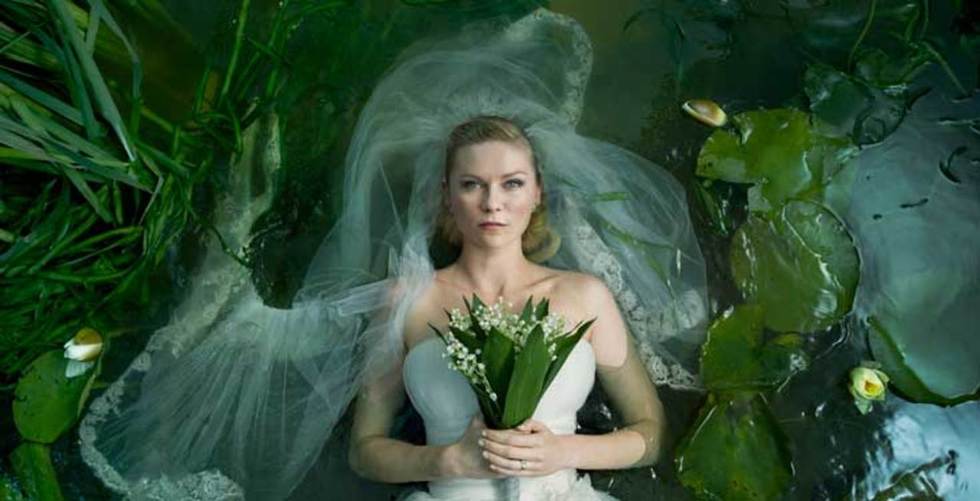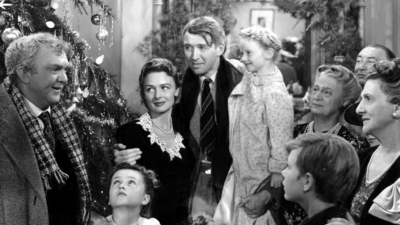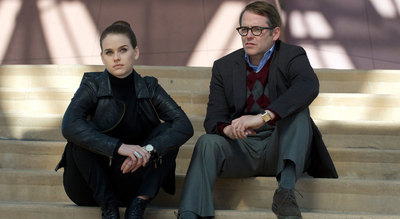
BY KAREN KEMMERLE |
Oscar Woulda Shoulda Coulda: The Ladies
This week we honor 10 iconic female performances that never reached the starting line in the Academy Awards race.

In the movie business, 2012 is coming to be known as “the year of the Oscar snubs.” Outstanding films like Shame, Tinker Tailor Soldier Spy and Bridesmaids were ignored in the Best Motion Picture category. Likewise, a number of exceptional performances went unrecognized when the nominations for Best Actor and Best Actress were announced. These omissions frustrated critics and fans who believed that actors such as Michael Shannon (in Take Shelter), Woody Harrelson (in Rampart), Tilda Swinton (in We Need To Talk About Kevin), and Elizabeth Olsen (in Martha Marcy May Marlene) deserved better from the Academy.
In fact, these laments are nothing new. The list of movie greats who, despite nominations, never won an Academy Award (Harvey Keitel, Cary Grant, Gena Rowlands, Deborah Kerr) is long and depressing, and 2012 is not the only year when many noteworthy actors and performances did not get the chance to compete in the Oscar race.

In a two-part series, we have decided to recognize some particularly fine performances that were ignored by the Academy but should by no means slide into movie oblivion. This week, it’s ladies first.
Kirsten Dunst in Melancholia (2011)
Role: Justine
It tastes like ashes!
It is rare that we are able to watch an actor mature on screen the way Kirsten Dunst has managed to do. As a child actress, she glowed in Little Women, and she increasingly broadened her range as she moved into more mature roles. Her performance in Melancholia, which garnered the Best Actress Prize at Cannes this year, is her most nuanced and accomplished work to date. In one of the starkest portrayals of depression ever captured on film, Dunst is mesmerizing as Justine, a character who first appears to the audience as a blushing bride who is not as she appears. Dunst as Justine conveys a wide range of emotions—fragility, contentment, sorrow, apathy, anger—and finally falls into crippling melancholia once she realizes that the end of the world is nigh. The physicality of Dunst's performance is equally impressive, as evidenced by the scene in which her sister, Claire, attempts to help Justine move her lethargic limbs so that she get into the bath. The physical strain reflected in Dunst’s face conveys her helplessness much more effectively than dialogue. Perhaps Lars von Trier’s tirade at Cannes chilled enthusiasm for the film, but whatever the reason, it is almost criminal that this masterful performance was snubbed.
Christine Lahti in Running on Empty (1988)
Role: Annie Pope/ Cynthia Manfield
Please tell Mom that I love her. I’ve thought of you both so often. I’ve called out to you. I’m sorry that I caused you so much pain. I guess I’m about to see what it feels like.
Sidney Lumet is known as an actor’s director, and the performance he draws out of Christine Lahti in Running on Empty certainly justifies his reputation. This film, about a husband and wife who live as fugitives because of their involvement in a political demonstration that went horribly awry, features a stellar ensemble cast, including River Phoenix (rightfully nominated for an Oscar), Judd Hirsch, and Martha Plimpton. However, it is Lahti’s overlooked performance as the family’s sensitive but tough matriarch that truly stands out. Lahti’s Annie/Cynthia loves her sons more than anything and knows she has deprived them of a normal life. She is torn when her oldest son, Danny, is offered a scholarship to Juilliard to study the piano. The emotional climax of the film comes when Annie/Cynthia meets with her estranged father to discuss Danny’s opportunity and reveals that she herself was a musical prodigy. Lahti puts the audience through the emotional wringer as she tearfully apologizes to her father for the worry she has caused him and begs him to accept Danny as his grandson. Christine Lahti did win an Oscar in 1995 for a short film she directed and starred in, making up somewhat for the Academy’s failure to reward her skillful performance in Running on Empty.
Michelle Rodriguez in Girlfight (2000)
Role: Diana Guzman
Now that I've got school covered, I've only have the world outside these walls to mess up.
In one of the most notable debut performances in recent years, Michelle Rodriguez literally came out swinging as a young female boxer in Girlfight. Rodriguez plays Diana Guzman, a spirited teen with a bad attitude, who by chance ends up in the ring after a boxer sucker-punches her little brother. Rodriguez gives a raw and miraculous performance, successfully conveying the complexity of a character that is aggressive, tough, and determined, but also capable of tenderness and kindness. When the audience first sees Diana, she is staring down at the camera against the backdrop of a sea of lockers, her face full of resentment and rage. Rodriguez’s eyes burn with intensity in every scene, and she is ferocious and unrelenting in the ring. Equally convincing is the catharsis she achieves through an emotional confrontation with her father as the film nears its end. That Michelle Rodriguez was not recognized by the Academy for her explosive performance is made even more lamentable by the fact that she has not received such a meaty role again. Here’s hoping she will get the opportunity soon.
Barbara Stanwyck in The Lady Eve (1941)
Role: Jean Harrington
They say a moonlit deck is a woman's business office.
Though Barbara Stanwyck was nominated four times for Oscar gold over her long acting career (receiving only an honorary Oscar in 1982), she was never better than she was as the beautiful, card-dealing, con artist Jean Harrington in The Lady Eve. Seldom do actresses fare better in screwball comedies than Stanwyck, who expertly delivers Preston Sturges’ rapid-fire dialogue as she manipulates her prey, a snake-obsessed brewery heir, Charles Pike (Henry Fonda). Stanwyck sparkles opposite Fonda and displays her acting chops when she plays Jean pretending to be the Lady Eve Sidwich, who is out to teach Charles a lesson about women. It is a joy to watch Stanwyck as Jean/Eve tormenting the hapless Charles while remaining deeply in love with him. Her performance in The Lady Eve confirmed Stanwyck’s exceptional comedic talents, and she deserved better from the Academy.
Faye Dunaway in Mommie Dearest (1981)
Role: Joan Crawford
Tina…bring me the axe!
All right, it’s true that just the utterance of the title “Mommie Dearest” can illicit giggles, but Faye Dunaway ’s over the top performance as Joan Crawford is no laughing matter. Dunaway embodies Christina Crawford’s nightmare vision of her mother. Whether she is plotting her next career movie or sleazily sleeping with film producers or adopting children to get back in the public eye, Dunaway attacks the role with manic energy and shows no concern for her own vanity. As she ages and becomes less relevant, her make-up becomes thicker, her voice more strained, and her eyes less focused. Dunaway unselfconsciously whips children with coat hangers and, in an unforgettable sequence, hacks at a palm tree with an axe. Even more bravely, she delivers numerous iconic movie lines as part of a tour de force performance that has been studied and reenacted by so many drag queens that we stopped counting. So how could Oscar not join in the celebrations?
Chloe Webb in Sid and Nancy (1986)
Role: Nancy Spungen
I'll never look like Barbie. Barbie doesn't have bruises.
Chloe Webb’s powerhouse performance as Nancy Spungen, Sid’s better half, sticks with the audience long after they have left the theater. Webb seems to channel the real Nancy in every way, from her guttural voice to her drugged-out movements, and almost embodies Nancy’s gritty, dirty beauty and intoxicating presence. Her performance complements Gary Oldman’s Sid, and the two effectively inhabit the strange world of sweaty leather, tangled bed sheets and used needles that this self-destructive duo created. Perhaps Webb’s most memorable scene is when the couple visit Nancy’s seemingly well adjusted extended nuclear family. When the two can’t even complete coherent sentences, the family tries to politely kick them out, and the look of hurt realization on Webb’s face is astonishing. Webb’s performance went unrecognized by Oscar, but man oh man, did she leave an impression.
Pam Grier in Jackie Brown (1997)
Role: Jackie Brown
The way I see it is that you and me got one thing to talk about, one thing, and that’s what you are willing to do for me.
It was only a matter of time before Pam Grier, the queen of the blaxploitation era, appeared in a Quentin Tarantino film, given Tarantino’s excessive fondness for the genre. Grier plays the title character in Jackie Brown, and turns in a remarkable performance as a flight attendant who, out of necessity, turns into one cool operator, remaining one step ahead of all the men in her life. Grier’s Jackie plays both sides masterfully once she is arrested after making a run for Ordell Robbie, a feared crime kingpin. Grier humanizes the tough and world-weary Jackie despite her double-crossing ways, managing to convey the character’s vulnerability through her believable relationship with the lovelorn Max Cherry (Robert Forester), which is the heart of the movie. Though the audience thinks that she only likes him after he provides her with crucial help, their attraction proves to be real, and the two share a heartfelt goodbye as Jackie leaves town to start fresh. Pam Grier celebrated a well-deserved career resurgence after the film was released, but was slighted by Oscar.
Nicole Kidman in To Die For (1995)
Role: Suzanne Stone
You aren't really anybody in America if you're not on TV.
It’s hard to believe that Nicole Kidman’s groundbreaking performance as Suzanne Stone in To Die For did not garner an Academy Award nomination. Kidman is captivating in her portrayal of a seemingly ordinary weather girl whose affection for her husband turns into a burning hatred as she longs for stardom. Kidman gradually reveals the characteristics that make Stone tick—she is conceited, seductive, overly ambitious and self-absorbed—but still manages somehow to make the audience feel for the woman. As Stone, Kidman always plays to the camera, no matter where the location: she is flawlessly dressed, always in full hair and makeup, conscious of her body and deliberate in her speech. Kidman is particularly skillful in a scene in which Stone confronts one of her teen accomplices at the mall and tries to manipulate the girl’s “innocence” to dissuade her from going to the police, not realizing that the girl is already wired. Kidman went on to multiple nominations and an Oscar (for The Hours), but we will always remember her as our favorite “on-air correspondent.”
Kathleen Turner in Body Heat (1981)
Role: Matty Walker
You’re not too smart. I like that in a man.
Has a woman ever looked as beautiful on screen as Kathleen Turner in Body Heat? In her big screen debut, Turner sizzles in this neo noir as Matty Walker, a sexually confident woman who manipulates her lover, Ned, into killing her husband without ever saying the word murder. Her performance is a throwback to the great film fatales of the past (played by the likes of Barbara Stanwyck and Lana Turner), as she slinks around in the Florida heat in flimsy white outfits. The screen seems to literally steam up when Turner appears, and her performance as the complex, diabolical, and conniving temptress remains a noir standard. Kathleen Turner’s career soared after Body Heat, and she has since worked with directors such as Francis Ford Coppola, John Waters and John Houston, but she has never gotten close to a golden statue.
Laura Dern in Citizen Ruth (1996)
Role: Ruth Stoops
I'm gonna stay here and I'm gonna have that abortion like I wanted. 'Cause I'm a citizen and... I got my rights to, um, PICK.
Laura Dern gamely tackles the role of Ruth Stoops in Alexander Payne’s satirical debut feature, Citizen Ruth. Ruth is a poor, uneducated, mother of four children, who have been taken away from her by the state because of her drug use. After discovering that she is pregnant again, she is ordered by the court to have an abortion or be charged with the “felony criminal endangerment of a fetus.” Ruth unwittingly steps into the middle of a heated war between pro-choice activists and the “baby savers,” and Dern manages to portray this loud, crude, disrespectful and incredibly selfish character in a strangely sympathetic fashion. Given the despicable people on both sides of the abortion debate, the audience can hardly blame Ruth for playing both sides and seeing which will pay her more money to decide the fate of her unborn child. Like any addict, Dern’s Ruth is cunning and determined to survive, characteristics that Dern manages to turn into positives in an incredibly complex performance shunned by the Academy. Laura Dern is currently on the hit HBO show Enlightened, and of course, is absolutely brilliant. Take that, Oscar.
Next week: The Men.
In the meantime, what performances have we overlooked? Tell us in the comments below.

